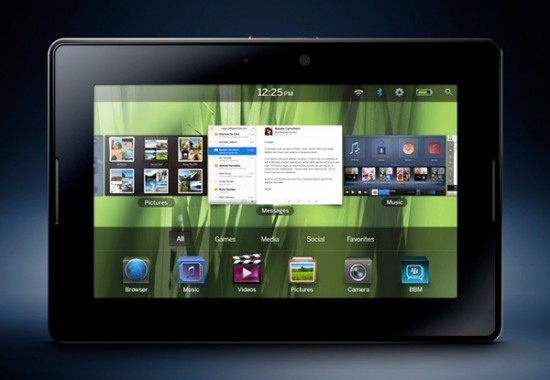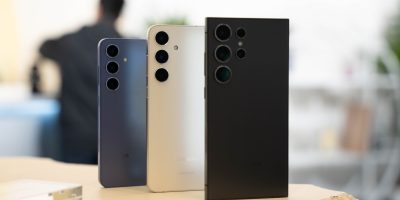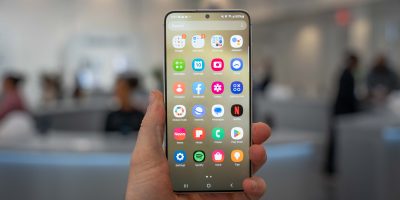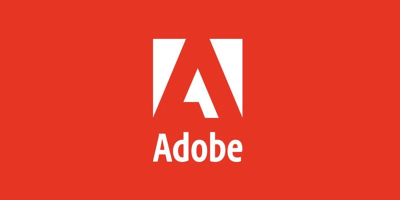
When the rumors began swirling that RIM was cooking up support for Android apps in their upcoming BlackBerry PlayBook (and possibly future smartphones), most thought the idea a bit too out there to be true. Well, read it and weep (or rejoice): Android app support has officially been announced for the PlayBook tablet, which is set for an April 19th release.
A “high degree of API compatibility” will make it easy for Android developers to quickly port their applications to the PlayBook, though it appears they will still need to be uploaded and accessed from BlackBerry App World. Once downloaded, apps will run via one of two optional “app players.”
The implications of this could make or break RIM’s new tablet. Android currently has access to right around 200,000 applications (give or take 50,000, depending on who you ask), and if developers choose to do so these additional apps could sway more than a few buyers in BlackBerry’s direction. No word on how Google views the move, but it seems RIM has sidestepped some heat by at least requiring developers to modify their applications before they are BlackBerry capable.
RIM Expands Application Ecosystem for BlackBerry PlayBook
Research in MotionRIMM | 3/24/2011 4:51:13 PM
– BlackBerry PlayBook to support BlackBerry Java and Android apps
– Native C/C++ development support added, in addition to HTML5, Flash and AIR support
– Support from leading game engines: Ideaworks Labs (AirPlay) and Unity Technologies (Unity 3)
– BlackBerry PlayBook becomes a new market opportunity for all the developers who have already created over 25,000 BlackBerry Java apps and more than 200,000 Android appsWATERLOO, ONTARIO, Mar 24, 2011 (Marketwire via COMTEX News Network) —
Developers wanting to bring their new and existing apps to the highly anticipated BlackBerry(R) PlayBook(TM) tablet will soon have additional tools and options to enhance and expand their commercial opportunities. Research In Motion (RIM) (NASDAQ:RIMM)(TSX:RIM) today announced plans to greatly expand the application ecosystem for the BlackBerry PlayBook. The BlackBerry PlayBook is scheduled to launch in the U.S. and Canada on April 19.
RIM will launch two optional “app players” that provide an application run-time environment for BlackBerry Java(R) apps and Android v2.3 apps. These new app players will allow users to download BlackBerry Java apps and Android apps from BlackBerry App World and run them on their BlackBerry PlayBook.
In addition, RIM will shortly release the native SDK for the BlackBerry PlayBook enabling C/C++ application development on the BlackBerry(R) Tablet OS. For game-specific developers, RIM is also announcing that it has gained support from two leading game development tooling companies, allowing developers to use the cross-platform game engines from Ideaworks Labs and Unity Technologies to bring their games to the BlackBerry PlayBook.
Support for BlackBerry Java and Android Apps
“The BlackBerry PlayBook is an amazing tablet. The power that we have embedded creates one of the most compelling app experiences available in a mobile computing device today,” said Mike Lazaridis, President and Co-CEO at Research In Motion. “The upcoming addition of BlackBerry Java and Android apps for the BlackBerry PlayBook on BlackBerry App World will provide our users with an even greater choice of apps and will also showcase the versatility of the platform.”
Developers currently building for the BlackBerry or Android platforms will be able to quickly and easily port their apps to run on the BlackBerry Tablet OS thanks to a high degree of API compatibility. The new optional app players will be available for download from BlackBerry App World and will be placed in a secure “sandbox” on the BlackBerry PlayBook where the BlackBerry Java or Android apps can be run.
Developers will simply repackage, code sign and submit their BlackBerry Java and Android apps to BlackBerry App World. Once approved, the apps will be distributed through BlackBerry App World, providing a new opportunity for many developers to reach BlackBerry PlayBook users. Users will be able to download both the app players and the BlackBerry Java and Android apps from BlackBerry App World.
The BlackBerry PlayBook and BlackBerry Tablet OS are built on the QNX(R) Neutrino(R) microkernel architecture with a 1GHz dual core processor and a leading OpenGL solution, which allows RIM to make this incredibly broad platform support possible.
BlackBerry PlayBook users and developers who are interested in seeing the new app players for BlackBerry Java and Android apps can see demos at BlackBerry World in Orlando, Florida (May 3 to 5, 2011) (www.blackberryworld.com).
BlackBerry Tablet OS Development Tools
The BlackBerry Tablet OS already supports an incredibly robust platform with support for Web development standard HTML5, through the BlackBerry(R) WebWorks(TM) SDK for Tablet OS, and Adobe(R) AIR(R), through the BlackBerry Tablet OS SDK for Adobe AIR. The BlackBerry Tablet OS is built from the ground up to run WebKit and Adobe(R) Flash(R) as well, giving developers a fast and true Web experience to leverage.
RIM is also announcing today that the BlackBerry Tablet OS Native Development Kit (NDK), which is currently in limited alpha release, will go into open Beta by this summer and be demonstrated at BlackBerry World. The BlackBerry Tablet OS NDK will allow developers to build high-performance, multi-threaded, native C/C++ applications with industry standard GNU toolchains. Developers can create advanced 2D and 3D applications and special effects by leveraging programmable shaders available in hardware-accelerated OpenGL ES 2.0.
Other features of the BlackBerry Tablet OS NDK will allow developers to:
— Take advantage of the QNX POSIX library support and C/C++ compliance for
quick and easy application porting and for creating native extensions
for both BlackBerry and Android applications
— Easily integrate device events like gesture swipes and touch screen
inputs
— Integrate the BlackBerry Tablet OS environment into existing code
management and build systems using industry standard Eclipse CDT (C/C++
Development Tools)
— Leverage work done in standard C/C++ to make it easier to bring
applications to the BlackBerry Tablet OS
— Find and fix bugs quickly with provided debug and analysis tools“The response to the BlackBerry PlayBook from the developer community has been exceptional. Our commitment to supporting HTML5 and Adobe AIR development has resonated and spurred developers to create fun and innovative applications for BlackBerry PlayBook users,” said David Yach, Chief Technology Officer, Software at Research In Motion. “The upcoming BlackBerry Tablet OS NDK beta will add C/C++ tools to our repertoire and gives developers one of the broadest and deepest platforms to develop on.”
Gaming Engines
Building on the power of the BlackBerry Tablet OS NDK, RIM is working with leading gaming and application development technology providers such as Ideaworks Labs and Unity Technologies to implement their native engines and application development platforms. Developers will be able to take advantage of these engines when building games and other applications for the BlackBerry PlayBook.
The Ideaworks Labs Airplay SDK is expected to include support for the BlackBerry Tablet OS soon, making it easy for publishers and developers to use their existing code to bring their games and apps to the BlackBerry PlayBook.
“Supporting a new OS can be a challenge for developers,” says Alex Caccia, President of Ideaworks Labs, “however, integration of the BlackBerry Tablet OS with the Airplay SDK makes this a non-issue. We think this is a far-sighted move by RIM: the BlackBerry PlayBook is a great device for games and applications, and combining this with content distribution via BlackBerry App World brings an exciting new ecosystem for developers.”
RIM has also been working closely with Unity Technologies, providers of the highly popular, multi-platform Unity development platform and Union, the firm’s games distribution service. Through Union, dozens of high-quality Unity-authored games are slated to make their way to BlackBerry App World for the BlackBerry Playbook.
“With a sharp focus on the multimedia experience, very powerful hardware, and fantastic games in the pipeline, the BlackBerry Playbook has all the right ingredients to be a mainstream hit,” said Brett Seyler, GM of Union at Unity Technologies. “Through Union, Unity developers have an opportunity to reach a new audience and grow with another great new platform.”
Availability
The new app players for the BlackBerry PlayBook are expected to be available from BlackBerry App World this summer. More information and demonstrations of the new app players will be shared at BlackBerry World. The BlackBerry Tablet OS NDK will be available in beta later this year and will also be showcased at BlackBerry World.
Useful Links
For more information on the BlackBerry Tablet OS and BlackBerry PlayBook developing, visit http://us.blackberry.com/developers/tablet/
To see the BlackBerry Tablet OS in action running conceptual applications from The Astonishing Tribe, please visit http://www.youtube.com/blackberry#p/c/8D8C3A23664E6761/5/uH7NKhNyygw and http://www.youtube.com/blackberry#p/c/8D8C3A23664E6761/0/mWJG-sB7H4Y.
For RIM insights into developing for the BlackBerry Platform, visit http://devblog.blackberry.com or follow @BlackBerryDev on Twitter.
Visit the BlackBerry Developer Zone at www.blackberry.com/developers for the latest news, information and updates for BlackBerry developers.
Visit the BlackBerry Developer Video Library at www.blackberry.com/go/developervideolibrary to view a variety of instructional videos.
Sign up for the BlackBerry Developer Newsletter at http://na.blackberry.com/eng/developers/resources/newsletter.jsp.
For the latest news and information about the BlackBerry Developer Conference visit www.blackberrydeveloperconference.com.










Awesome, still getting a Xoom but… good for our market as well as their device.
Love to know when there’s word on how Google views the move!
@ David…Google’s view of the world is to sell more add space. The main reason they are into the phones is so there is an un-interrupted platform for their services/ads. This gives Google a wider reach which means they are in 7th heaven, they could not have dreamed this up themselves
You’re exactly right. Google wants the world to view the web more because thats where Google makes money. Google’s real business is selling ad space online, so offering a compelling smartphone platform not only gets more people online more often but also drives the competition. Google could care less how successful iOS really is as long as more people are using devices running iOS to use Google services more. This is much the same. This simply means better smartphones for everyone, which in turn means more time online, which in turn means more money for Google. We get better devices and Google gets us viewing their ads. Its a win-win.
Eric Schmidt said Android is also bringing in money by it self now!
But I agree their main reason for involving in the smartpone business is to make more money on ads…
I hope the Playbook fails hard. Blackberrys are over-rated. I’ve personally converted 3 users to Android who havn’t looked back!
Fanboy ALERT
Well you are on a site dedicated to Android news.
LOL IKR. GO TOBY. -highfives-
why would you want it to fail if it helps your platform???
They always come back to Blackberry if they want to get their emails the same decade. Android and ios email sucks a big one.
A brilliant decision otherwise this was dead in the water. I wonder if Honeycomb specific apps will work.
I wouldn’t think so considering they are honeycomb specific and the playbook doesn’t run honeycomb. That would be pretty awesome though.
Can we do this for Android, but using iOS’s apps?
No, iOS apps are written in Objective-C, which is nothing like any of the other languages. It’d take a total rewrite to make them work. The Playbook’s OS is technologically much more open than Android or iOS — that’s one big advantage it has.
I wonder if anyone will port Android to the Playbook outright, though. That’d be pretty sweet.
test
RIMM is getting pounded in the after hours session. Down 10% and climbing. It seems like RIMM investors are feeling the collapse in sales from Android. It seems like NOK will be a good short soon….
RIMM is getting pounded because their financial outlook disappoints in the near term.
I actually think this move will be good for them in the short term, and good for Google in the long term.
Why would Google care? This simply means more interest in app development for Android. Google is also a big proponent of Android being open source and to me this just seems like another part of what open source means. Google doesn’t care that manufacturers place skins on top of Android because of the openness, so I don’t see why they would have a different view on this.
Yeah you didn’t see that google is withholding honeycomb from aosp and it’s preventing oem from skinning honeycomb.
No, I did, and I understand the issues there, but then again I see where Google is coming from. Google said for months that Android wasn’t ready for tablets and what did manufacturers do, they took advantage of Android being open and started putting it on tablets giving people a bad taste in their mouth about Android tablets. Google doesn’t want this to reverse with Honeycomb ending up on things like PMP’s and small internet tablets. They want Honeycomb to gain an identity as a tablet-focused OS and if manufacturers start throwing it on everything under the sun, it defeats the purpose.
Yeah but then they shouldn’t go around toting “open source” like that, I love android and I would stick around and support google if they plainly said, we are taking over!
Sent from ?
OEM’s put regular android on tablets because google didn’t have Honeycomb yet but they wanted to get into the tablet game.
There’s no reason to put honeycomb on phones when they already have gingerbread for that.
All this does is hurt community modders, the people who are the first to buy android tablets.
Lol can we fix the comment board?
Smart move. It also gives even more cred to android.
The key here is it will help draw people away from the iPad.
I am so glad to finally get Disqus on this site! Thank You!!!!
All of my blogs are on Disqus now, but 1. I’m looking at you AC.
@Phandroid
Thank you for finally switching your comment system to Disqus!
Now, the only major change that’s needed is a mobile website.
OK… so it can run android app *if* a developer decides to port it over. That should help it some, but why would anyone want this over an Android tablet that can use all Android apps natively?
Just because of the BB name? They could have made a true Android tablet and put the BB name on it. Doesn’t seem to me like this tablet is going to go anywhere.
BB should swallow their pride and go Android.
Using an app to open an app!
Appception
I like this tablet a lot but I want it to be half the price